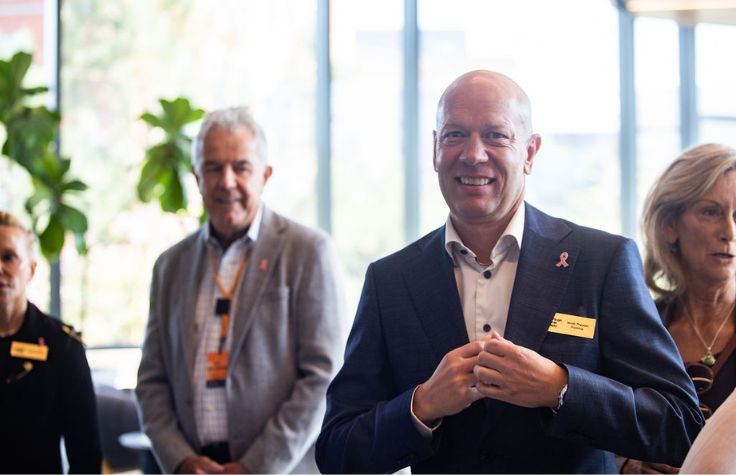
23 October 2025
“Genomics is reshaping how we understand cancer, how we diagnose it, how we treat it, and how we monitor it,” Illumina Global Patient Advocacy Lead Shirlene Badger said during her opening remarks at the first Genomics in Oncology Leaders’ (GOAL) Summit. The event was hosted by Illumina earlier this month at its San Diego headquarters. Badger continued, “But while the benefits of genomics in cancer are clear, uptake remains uneven. As patient advocates, we know better than anyone the consequences: that this means our friends, our family—they are dying.”
The three-day event, based on a similar initiative Illumina led in Europe (the Genomics in Oncology Patient Expert Network, or GOPEN), convened a select group of patient leaders from across the United States to explore the transformative role of genomics in cancer care. Participants represented a variety of tumor types and stakeholder groups—including the Rare Cancer Research Foundation, Go2 for Lung Cancer, Blood Cancer United, and SHARE Cancer Support—and brought varying levels of familiarity with genomics.
During the summit, attendees learned about the latest advancements in genomic technologies, discussed challenges and opportunities for patient access, and shared best practices and lessons learned from their own work. A major theme of the summit was exploring how participants—and Illumina—could work together more closely to advance awareness and increase access to genomics.
Organized by Illumina’s patient advocacy team, the GOAL Summit agenda featured over a dozen sessions focused on the use of genomics throughout the cancer journey, such as genetic testing for inherited cancer risk, biomarker testing, minimal residual disease (MRD) testing (which can monitor disease progression and risk of recurrence), and more. In addition, participants collaborated on topics spanning foundational science, clinical applications, the policy landscape, and patient-advocacy-driven interventions.
Illumina Patient Advocacy Specialist Cody Barnett explains: “We intended for the GOAL Summit to provide a forum where we could not only break down what is meant by genomics in oncology, but also one where we could spotlight the many ways that patient advocates have been instrumental in expanding access to things like biomarker testing. Patient advocacy groups have designed programs and campaigns aimed at raising awareness of precision medicine with patients, families, and medical providers, and in other cases, have launched studies that have helped to prove the clinical utility in their cancer type.”

Breaking barriers to genomic testing
In addition to highlighting the clinical role of genomics, the summit also explored the state of patient access, and the obstacles that too often get in the way. Emily Dalton, associate director of medical affairs for oncology, shared the striking statistic that 64% of patients with advanced non-small-cell lung cancer (NSCLC) were not benefiting from precision oncology, despite proven clinical benefits, including more prolonged overall survival. “This is due to a variety of operational and clinical factors,” Dalton said, “including limited tissue specimens, appropriate biomarker testing not being ordered, and challenges with interpreting biomarker test reports resulting in patients not being put on the appropriate targeted therapy.”
Patient stories were at the heart of the discussions. Leaders from patient advocacy groups shared firsthand accounts of navigating cancer care and the impact of genomic testing in transforming their cancer journey.
Nefa-Tari Moore, director of Black women’s outreach at SHARE Cancer Support, shared her journey with uterine and ovarian cancer and her experience of not being offered genetic testing until after she had relapsed. “My doctor was shocked I wasn’t offered it the first time, but I was just dismissed, even after asking to have genetic testing,” she said. “Maybe it’s because I’m a Black woman, a Muslim woman, or maybe because I was young. My advice to other patients is to know your rights and advocate for yourself.”
What is the future of expanded use of genomics in oncology?
Eric Duncavage, director of the Division of Genomic and Molecular Pathology at Washington University School of Medicine in St. Louis, discussed his research examining the use of whole-genome sequencing (WGS) for acute myeloid leukemia. In his landmark publication in the New England Journal of Medicine, he determined that WGS identified new findings in 25% of cases compared to standard-of-care testing. Further, he determined that WGS had a lower failure rate, was simpler to run in the lab, generated data that is more easily compared across labs, and is more adaptable as we continue to learn more about what drives cancer.
“Precision medicine requires precision diagnostics,” Duncavage said. “Of the 75 novel oncology drugs approved over the past five years, 46 were ‘precision oncology therapies’ that required knowledge of gene mutation status.”

Empowering patient advocates with the Genomics in Oncology Catalyst Fund
The momentum doesn’t stop with the conclusion of the summit. The Illumina Corporate Foundation has committed up to $100,000 in grants to US-based patient advocacy organizations. These grants will support initiatives that address barriers to genomic testing, raise awareness for its role in cancer care, and empower patients and families to use genomic information in shared decision-making with their health care providers.
“Patient advocates are a disruptive force for good—challenging norms, reshaping policy, and ensuring the patient's voice drives progress,” said Illumina CEO Jacob Thaysen. “I’m proud to support you in these efforts.”
Participation in the summit is not required to apply for these grants. Additional information will be released soon.


